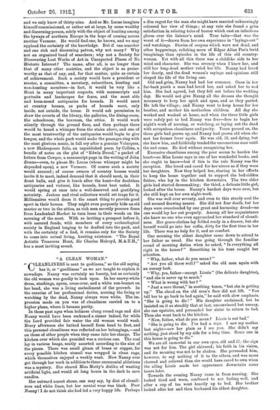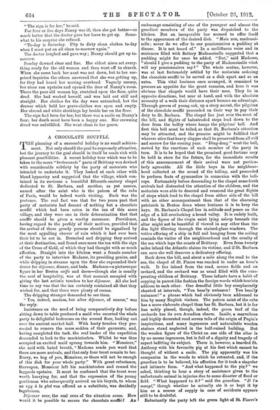"A CLEAN WOMAN."
" CLEANLINESS is next to godliness," so the old saying has it, or " goodliness " as we arc taught to explain it nowadays. Nanny was certainly no beauty, but as certainly the old woman was goodly to look upon. In her snowy-white dress, stockings, apron, cross-over, and a white sun-bonnet on her head, she was a living embodiment of the proverb. In the exercise of her professional duties, nursing the living or watching by the dead, Nanny always wore white. The im- pression made on you was of cleanliness carried on to a higher plane, where it became purity.
In those past ages when holiness clung round rags and dirt Nanny would have been reckoned a sinner indeed, for while the Lord provided fair water the old woman would wash. Every afternoon she bathed herself from head to foot, and this personal cleanliness was reflected on her belongings,—and on those of other people when they came into her charge. The kitchen over which she presided was a curious one. The coal lay in various heaps, neatly assorted according to the size of the pieces. There was small gleam of brass or copper, for every possible kitchen utensil was wrapped in clean rags, which themselves enjoyed a weekly wash. How Nanny ever got through her work in addition to these ceremonial ablutions was a mystery. She shared Miss Matty's dislike of wasting artificial light, and would sit long hours in the dark to save candles.
Her outward aspect shone, one may say, by dint of cleanli- ness and white linen, but her mental wear was black. Poor Nanny ! I do not think she had led a very happy life. Perhaps a dim regret for the man she might have married unknowingly coloured her view of things ; at any rate she found a grim satisfaction in relating tales of horror which cast an infectious gloom over the listener's mind. True tales—that was the worst of it—drawn from her own experience in "layings-out" and watchings. Stories of corpses which were not dead, and other happenings, relishing more of Edgar Allan Poe's lurid imaginings than episodes in the life of this old country- woman. Yet with all this there was a childlike side to her mind and character. She was seventy when I knew her, and still her long-dead mother ruled her life. Nanny had loved her dearly, and the dead woman's sayings and opinions still shaped the life of the living one.
Old and grim, Nanny had bad her romance. Once in her far-back youth a man had loved her, and asked her to wed him. She had agreed, but they fell out before the wedding day. He would not give Nanny all the dresses she thought necessary to keep her spick and span, and so they parted.
He left the village; and Nanny went to keep house for her brother, and mother his motherless children. All day she worked and washed at home, and when the three little girls were safely put to bed Nanny was free—free to begin her night's work of nursing, or watching, or laying out the dead with scrupulous cleanliness and purity. Years passed on, the three girls had grown up, and Nanny had grown old when she met her former lover again. He was old, ill, and dying, but she knew him, and faithfully tended the unconscious man until the end came. He died without recognizing her.
Excessive cleanliness among the poor seems to harden the heart—so Miss Loane says in one of her wonderful books, and she ought to know—but if this is the rule Nanny was the exception. She loved and cared for her nieces as if they were her daughters. Now they helped her, sharing in her efforts to keep the home together and to support the bed-ridden father, who lay in the kitchen downstairs. The two elder girls had started dressmaking ; the third, a delicate little girl, looked after the house. Nanny's hardest days were over, but she still kept on her own night-work.
She was well over seventy, and even to this sturdy soul the end seemed drawing nearer. She did not fear death, but her days were overclouded by one great and harassing dread—no one would lay her out properly. Among all her acquaintance she knew no one who even approached her standard of cleanli-
ness. Her grave-clothes lay folded ready in a drawer, but she herself would go into her coffin, dirty for the first time in her life. There was no help for it, and no comfort.
One morning the eldest daughter came down to attend to her father as usual. She was going through the familiar round of morning duties when he asked, " Is everything all right in the house? " Something in his tone caught her attention.
" Why, father, what do you mean ? "
" Are you all three well P " asked the old man again with an uneasy look.
"Why, yes, father—except Lizzie" (the delicate daughter), " and she is never up to much."
" What is wrong with her P " "Just a sore throat," in soothing tones, "but she is getting up." The cloud on the old man's face did not lift. "You tell her to go back to bed again," he said with slow emphasis. "She is going to die ! " His daughter exclaimed, but lie insisted on it so steadily that at last, unconvinced but uneasy, she ran upstairs, and persuaded her sister to return to bed. Then she went back to the kitchen.
"Now, father, what do you mean P Lizzie is not bad."
"She is going to die. I've had a sign. I saw my mother last night—saw her plain as I see you. She didn't say nothing, just stood by my side for a long time. Some one in this house is going to die."
We are all immortal in our own eyes, old and ill; the sign was not for him. The girl shivered ; his faith in his vision, and its meaning was not to be shaken. She persuaded him, however, to say nothing of it to the others, and was more cheered and relieved than she would have cared to own when the ailing Lizzie made her appearance downstairs some hours later. Towards the evening Nanny came in from nursing. She looked tired and worn, confessed to not feeling well, and after a cup of tea went heavily up to bed. Her brother looked after her and then beckoned his eldest daughter. " The sign is for her," he said.
For four or five days Nanny was ill, then she got better—so much better that the doctor gave her leave to get up. Some- what to his surprise she refused.
"To-day is Saturday. Pity to dirty clean clothes to-day when I must put on all clean to-morrow again."
The doctor laughed and gave way ; Nanny should get up to- morrow.
Sunday dawned clear and fine. Her eldest niece set every- thing ready for the old woman and then went off to church. When she came back her aunt was not down, but to her sur- prised inquiries the others answered that she was getting up, for they had heard her moving overhead. Vaguely uneasy, her niece ran upstairs and opened the door of Nanny's room. There the poor old woman lay, stretched upon the floor, quite dead. She had washed herself, and was laid out stiff and straight. Her clothes for the day were untouched, but the drawer which held her grave-clothes was open and empty. Her shroud and white stockings lay beside her on the floor.
The sign had been for her, but there was a smile on Nanny's face; her death must have been a happy one. Her crowning dread was unfulfilled. She went clean to her grave.



















































 Previous page
Previous page